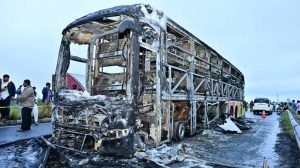Police arrest 600 at protest near IMF
WASHINGTON, APRIL 16: Police arrested some 600 protesters at a demonstration outside the International Monetary Fund on Saturday, where as...

WASHINGTON, APRIL 16: Police arrested some 600 protesters at a demonstration outside the International Monetary Fund on Saturday, where as many as 1,000 people had gathered to protest economic globalisation, Washington police said.
"These people were parading without a permit and while they were under police escort, they kept on disobeying the orders to keep to the sidewalks," said Washington’s assistant police chief, Terrence Gainer. The protesters were demonstrating outside the IMF, where a meeting of finance ministers of the world’s seven richest countries was underway.
Protesters were handcuffed and put on school buses parked nearby, then taken to a police training facility in the southern part of the city. Gainer said the arrested protesters "will probably be processed through the night."
About 300 police officers were patrolling the neighborhood where the demonstrators had gathered, Gainer said. "We think we have enough forces to keep the order in this town tomorrow," he added on Saturday.
After the G7 meeting, German development minister Heidemarie Wieczorek-Zeul told reporters she had "great empathy with people who fear a world dominated by the cold rules of the markets. But it is in times of globalisation that we particularly need global institutions who can steer this globalisation."
"Some demonstrators’ perceptions of the World Bank seem to me quite antiquated and do not correspond to reality anymore," she added. Thousands of activists ranging from anarchists to environmental radicals have converged on Washington for street protests against this weekend’s biannual meetings of the World Bank and IMF. The activists say the international lending organizations have worsened economic conditions and caused environmental degradation with many of the projects they sponsor in developing countries.
Early Saturday, in a pre-emptive bid to unsettle demonstrators, police shut down the city base where activists were preparing their protests and forced them to move out from the downtown area where the World Bank and the IMF are situated, saying their warehouse did not meet fire safety regulations. Patrick Reinsborough, a spokesman for the Mobilization for Global Justice, said Sunday’s protests would be aimed against multinational corporations that, in his words, were taking over the world.
"What we are saying is that increasingly our political system has become a tool of a small cartel of multinational corporations," said Reinsborough. "We envision a world where all voices are at the table … Right now, we have a system that put forward merely the profits of multinational corporations."
Despite pre-emptive organization by police ahead of protests on Saturday, planning for Sunday’s protests was in full swing. Following their eviction from the warehouse, protesters set up new headquarters further from the center of town where a workshop was underway.
A young woman, who refused to give her name, was explaining to those attending the workshop on non-violent protests the value of chaining oneself to the axle of a truck to prevent it from moving, which would in turn help block traffic.
At least 10,000 protesters were expected to respond to appeals by the labour confederation AFL-CIO and about 200 other groups and take part in street protests. Police are anxious to avoid a repeat of what happened in Seattle last November, when some radical demonstrators ransacked parts of the city during a World Trade Organization meeting. Protesters decried the arrests, saying they were heavy-handed and unprovoked. Washington’s police Chief Charles Ramsey said the protesters not only lacked a permit to hold their demonstration, but had also been disturbing the peace.
"We asked them to please get up on the sidewalk and they refused, tried to take the street and we took action," he said. Police were expected to be just as forceful in cracking down on protests planned for Sunday and Monday. "We’re just doing our job and doing it very professionally," Ramsey said.





- 01
- 02
- 03
- 04
- 05


























